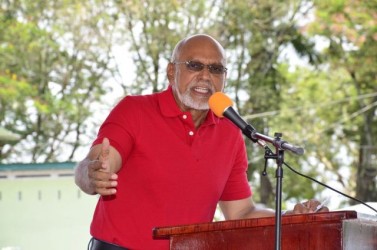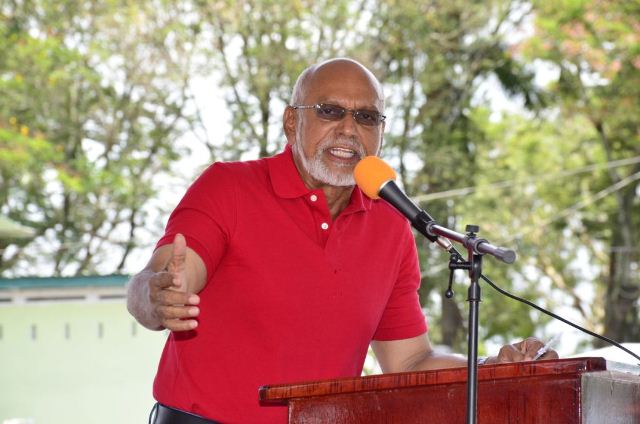Former president Donald Ramotar yesterday refused to answer questions about why he chose to pardon a man sentenced to life imprisonment for the kidnapping and murdering an eight-year-old boy.

At a press conference yesterday at Freedom House, Ramotar clammed up when asked why he had pardoned Ravindra Deo, who was convicted for the murder of Vishnu Bhim, which was committed 21 years ago at La Bonne Intention (LBI). Deo, although sentenced to hang, previously had his death sentence commuted to life imprisonment.
When told that it was in the public’s interest for him to explain why he would have made such a decision, Ramotar responded, “I will deal with that another time. This press conference wasn’t called for that.”
Other People’s Progressive Party (PPP) members immediately began to whisper among themselves and Ramotar abruptly ended the press briefing.
When he was approached a third time for a comment on the issue, Ramotar maintained that he was not prepared to answer any questions on the issue and promised to speak on it at a “more appropriate time.”
Deo was granted a presidential pardon late last week and is now a free man. The child’s parents have since expressed disappointment with the move.
Under Article 188 1 (A) of the Constitution, the president has the power to grant any person concerned in or convicted of any offence under the law of Guyana a pardon either free or subject to lawful condition.
Deo, now 39 years old, was found guilty by a jury in December, 1995 and sentenced to death by Justice Claudette Singh.
The child was on his way to school when he was kidnapped and taken via a bicycle to the backlands of LBI, where he was bound, gagged and murdered in a crime which had grabbed the attention of the nation.
According to evidence produced in the court, Deo had claimed that “Kresho,” the other person who was implicated, gave him a bike with a wooden bar and told him to take the child to LBI. Kresho was never found.
Bhim was taken down the LBI estate road in the vicinity of a trench surrounded by bush, where his shirt was torn and used to bind him.
A note was then sent to his parents requesting ransom of $1 million for his safe return.
Deo had later taken the police to the backlands, where the child’s swollen and battered body was found floating in a trench partly obscured by bushes. The cause of death was given as asphyxiation due to a fracture of the hyoid bone.
One lawyer questioned not only the release of a person who was convicted of murdering a child but also the timing. It was explained to this newspaper that some time ago Deo was one of many criminals on death row who had approached the High Court asking for his sentence to be commuted to life in prison. Based on the information gathered by this newspaper, acting Chief Justice Ian Chang granted this request in 2012. It is not known when Deo subsequently petitioned to be pardoned.
‘Wrong signal’
Meanwhile, the Guyana Hindu Dharmic Sabha has expressed extreme disappointment with Ramotar’s decision, stating that the pardoning and subsequent release of a child killer sends a “wrong signal” to those have committed or are inclined to commit such acts.
“In Guyana, violence against children is still prevalent and too often we read in the media about unspeakable acts being committed against our innocent little ones,” the organisation said in a statement. “Indeed, the Sabha is of the firm view that the most severe punishments should be meted out to those who inflict harm on children,” it further said.
It added that it remains committed to working towards the eradication of violence against children, and continues to provide a “safe haven” for child victims through Bal Nivas, a shelter for children at Ankerville, Berbice.

